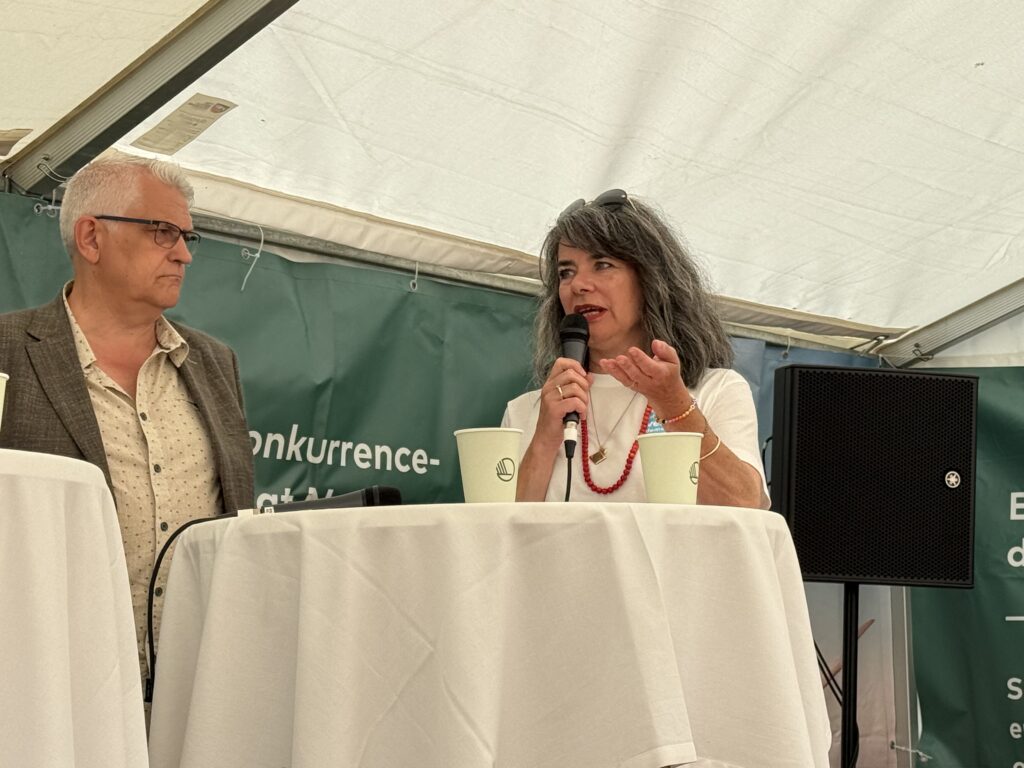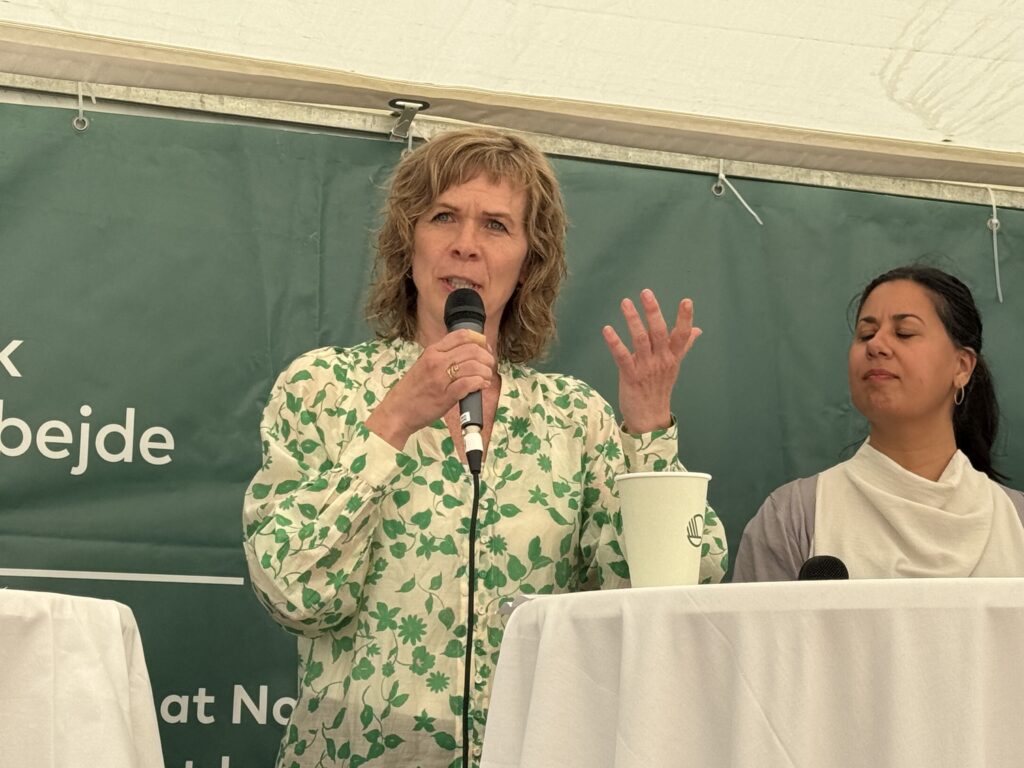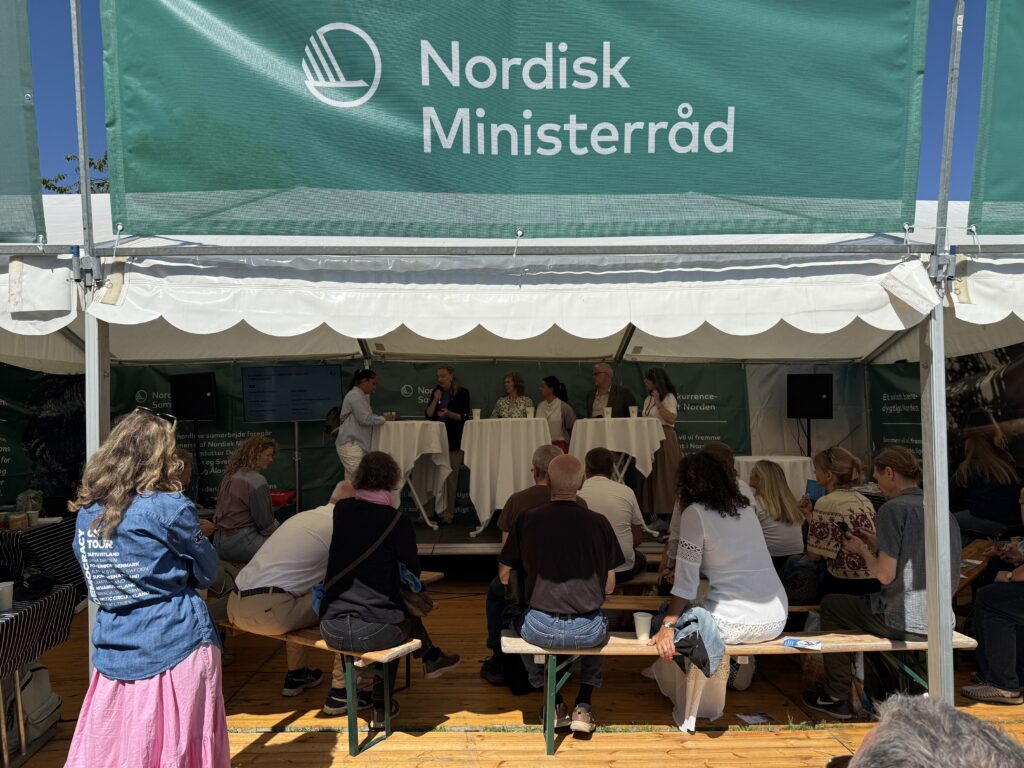Folkemødet: Experts discusses paths to work for migrant mothers
Integration, Work
15 Jun 2025
In a debate led by journalist Rushy Rashid Højbjerg, experts came together in the Nordic tent in sunny Bornholm to talk about an important but often missed part of labour market integration: being a parent. Based on new research shared by Kaisa Kepsu from the Nordic Welfare Center, the panelists discussed how being a mother or father – especially a migrant parent – can influence a person’s pathways into the Danish labour market. Since the debate took place in Denmark, it naturally focused on Danish circumstances.
Can you combine family and work?
Kaisa Kepsu’s presentation of a recent Nordic Council of Ministers/OECD report set the tone: having young children significantly impacts immigrant employment rates, especially for mothers. Migrant women face a double disadvantage – lagging behind both native-born women and migrant men in employment. These gaps are further accentuated because many work part-time, have unstable jobs, and face traditional gender role expectations.
Yet, Kepsu also pointed out the Nordic strengths: gender-equal welfare policies, flexible parental leave, and early childhood education. She described these systems as powerful tools for driving change. The report shows that policies really matter.
Empowering mothers – and fathers
Mai-Britt Haugaard Jeppesen, Director of Voluntary Social Work, Foundation for Social Responsibility, highlighted the cultural shock many refugee parents face.
Some women arrive with the belief that to be a good mother means staying at home,” she said. “But the Nordic expectation is full-time employment and self-sufficiency.”
Through language classes, job training, mentorship, and confidence-building, Haugaard Jeppesen’s programs meet migrant women where they are, while also involving fathers in reshaping their roles at home and in society.

A diverse group
Allan Westh, Head of Labour Market and Digitalization at Bornholm Regional Municipality, shared a practical, everyday view. He stressed the diversity of immigrant experiences – from well-educated Syrians to single mothers from the Democratic Republic of Congo who may have never worked outside the home. “You can’t treat them the same,” he said. “Support must be more individualized.” Bornholm is a municipality of 40,000 residents, including approximately 5,600 with a refugee background. The unemployment rate is low, and the municipality has been successful in integrating newcomers into the labour market.
Westh also emphasized the need for “cultural translation,” especially in job centers.
Employers and new arrivals often don’t speak the same language – not just literally, but socially and professionally. Bridging that gap is vital.
The struggle for recognition of skills
Panelist Muneeza Rosendahl, Director at the NGO Lige Adgang, addressed the undervaluing of foreign qualifications.
We had a Ukrainian woman with a two-year psychology degree. In Denmark, that’s not enough. But dismissing her entirely? That kills motivation.
Lige Adgang (Equal Access Association) connects newcomers with sector-specific mentors who offer guidance, workplace introductions, and much-needed encouragement.
Legal shifts
Anna Engedal Jacobsen, Senior Advisor at the Agency for International Recruitment and Integration (SIRI), discussed the recent reform that expects immigrant residents to enter the workforce after years of unemployment, “arbejdspligt“.

How can we achieve genuine inclusion?
The debate repeatedly circled back to a central theme: one size does not fit all. Why must someone become just like everyone else to be accepted at work? Why can’t they bring their background and still contribute?
As Allan Westh put it, “We often speak of integration, yet what we actually mean is assimilation.”
From self-employment to community-driven peer support, the panel showcased models that work with people’s identities, not against them. As former Danish integration minister Bertel Haarder in the audience noted, “We forget the potential in self-employment. These women have ideas. Why aren’t we supporting that?”
The shared conclusion everyone agreed on: real integration is not about ticking boxes, it’s about creating conditions where people feel seen and valued.
Muneeza Rosendahl ended with a simple but powerful message: “Vær nysgerrig” (Be curious).

Related news
Integration
27 Feb 2026
Nyt nordisk overblik: Børn med migrantbaggrund lever oftere i relativ fattigdom
Integration
26 Feb 2026
